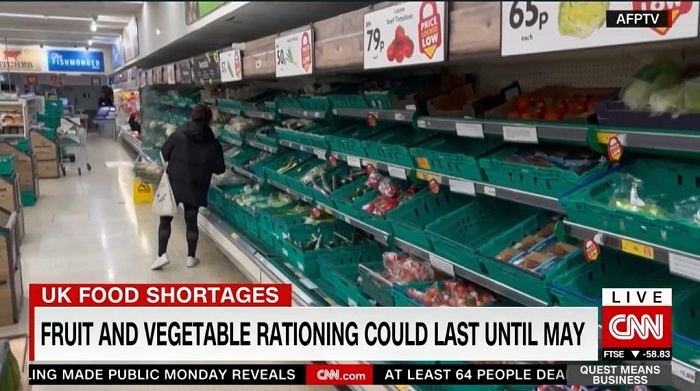
A measure of UK grocery price inflation soared to a record high this month — that’s more bad news for consumers already facing a shortage of fruit and vegetables that has led to rationing at major supermarkets.
Grocery prices rose 17.1% in the four weeks to February 19, compared with the same period a year ago, according to data published by Kantar Tuesday. That’s the highest rate of inflation since the data company started tracking it in 2008, and is equivalent to adding an extra £811 ($980) to a household’s average yearly grocery bill.
Fraser McKevitt, the head of the retail and consumer data unit at Kantar, said price increases were “having a big impact on people’s lives.” A quarter of UK shoppers said they were struggling financially, according to a Kantar survey in January, up from a fifth during the same period in 2022.
“Our latest research shows that grocery price inflation is the second most important financial issue for the public behind energy costs, with two-thirds of people concerned by food and drink prices,” McKevitt said.
The inflation figures come just days after a national shortage of some fruits and vegetables prompted five of the six biggest supermarkets in the United Kingdom to impose limits on purchases. Last week, Tesco (TSCDF), the country’s largest grocery retailer, said it would temporarily restrict customers to three packs of tomatoes, cucumbers and peppers each, among other staple products.
And on Tuesday, a spokesperson for the UK arm of Lidl, a discount German supermarket, told CNN that while it had “good availability’” of these products, it had introduced the same limits due to higher demand.
Supermarkets and the UK government have pointed to poor weather conditions in food exporters Spain and Morocco as the main cause of the shortages.
But growers’ groups have also blamed crippling energy costs, as well as Brexit-related lack of labor and trade barriers, for the tight supply.
Mark Spencer, the UK food and farming minister, held crisis talks with supermarket bosses on Monday to discuss their response to the shortages.
Spencer said on Twitter that he had asked supermarkets to “look again at how they work with [UK] farmers and how they buy fruit and vegetables, to further build preparedness for these unexpected incidents.”
“Our food supply chain is extremely resilient,” he said. But he added in a statement Tuesday that the current problems highlighted how dependent the country could be “certain trade routes for some types of food.”
At this time of year, the United Kingdom relies heavily on imported fruit and vegetables. According to the British Retail Consortium, a trade group, UK supermarkets import 95% of their tomatoes and 90% of their lettuce in December and typically the same proportions in March.
Andrew Opie, the BRC’s director of food and sustainability, said in a statement Tuesday that retailers were “working to address the current challenges” and that shoppers should see more fresh produce on their shelves “in the coming weeks.”
‘Killer’ inflation
Others are more downbeat.
Last week, the Lea Valley Growers Association, a group of 80 growers across the United Kingdom’s southeast, told CNN that vegetable shortages could last until May.
UK growers were not harvesting tomatoes, peppers and eggplants at this time of year, as is usually the case, because high energy costs this winter had delayed planting, said Lee Stiles, LGVA secretary.
And shortages could spread. Ali Capper, chairman of British Apples and Pears, a trade group representing 150 growers of the fruit, told CNN that huge increases in the costs of energy and labor last year had squeezed margins.
“[The] killer for all of us was inflation,” she said.
Energy price rises had pushed up every single input cost for farmers, she added, with the cost of production for apples ballooning 23% between the fall of 2021 and the fall of 2022.
UK apple farmers normally buy at least one million apple trees each winter for planting. But because of concerns about profitability, farmers slashed their orders to 500,000 this season, Capper said. What’s more, they have already canceled roughly a third of those orders. (CNN)
Consumers in the UK are facing a shortage of fruits and vegetables that has led to rationing at major supermarkets https://t.co/0EyRlS5y0j pic.twitter.com/sdUtqEZ0dX
— CNN (@CNN) March 1, 2023

